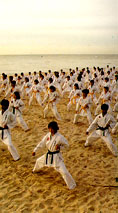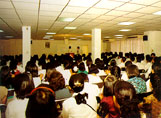Thailand
Missionary work began in 1975 with the arrival of German missionary Eva Studeman on April 28, American missionary Jack Hart on May 1, and Japanese missionary Akira Mitani on July 26.
Missionary Akira Mitani who had first come to Thailand on May 12 returned to Japan one month later, then came back to Thailand again. First of all, the missionaries devoted themselves to learning the Thai language while doing witnessing activity. Many people listened to the Principle but, in many cases, that was all.
The first member was Lek Thaveetermsakul who joined the church in 1976 while a junior in medical school. He was witnessed to by German missionary Wolfgang Schawaller who passed through Thailand on his way to Hong Kong because of a visa problem.
In April 1984, Korean missionary Byung-wooh Kim came to Thailand under direction from the World Mission Office. Under his supervision, the Unification Church of Thailand came to have renewed hope and vision. Everyday, he gave lectures and educated the members.He began to work from May 1, 1984 under the name "Unification Cultural Center," as the church was not officially registered at that time. He reorganized the church, held regular revival meetings, and New Truth seminars established a new research center and advanced the witnessing campaign.
On February 16 1985, he began a forty-day prayer with members at the Holy Ground in Bangkok that Reverend Moon had selected in 1965. By this time, two witnessing centers had been established in Bangkok.
As a result of efforts devoted to new activities on the university campus, CARP was established at Ramkhamhaeng University. A series of lectures for special policeman also began. Soon after, a seminar to introduce the Unification Principle was held for professors in Thailand.
As the number of missionary centers increased throughout Bangkok and other cities through the energetic witnessing activities between 1985 and 1987, membership also increased. At the same time, CARP activity was becoming all the more brisk and thus well known among students. The first video center was opened in July 1987, near Ramkhamhaeng University, to witness to students through video-taped Principle lectures.
Dialogue among religions was carried out through many conferences. The year 1988 was a very important turning point in the development of the church in Thailand. The church purchased a four-story building in a suburban area for use as a training center. The seven-day Unification Principle seminars and three-day lecture series for guidance in life of faith were therefore able to develop. Video centers for teaching the Unification Principle were also established regionally. As its first activity of that kind, CAUSA held a one-day seminar for distinguished members of society. This was very successful. The seminar received a lot of support from General Saiyud Kerdpol. He hoped that the CAUSA ideology could be translated into Thai and thus introduced to the people of Thailand.
Most significantly during this year of 1988, Thailand successfully staged the Fifth CARP Convention of World Students in August, with support from Ramkhamhaeng University. The event profoundly influenced the mission of the Unification movement in its outreach to the general public and to university students in particular.
Immediately after the convention, a large and well-equipped video center was opened right across from the university in order to witness to students more efficiently. The entire space of the second floor of an apartment building was used to build the video center. The center is equipped with a conference hall with a capacity of two or three hundred, two video rooms installed with forty video recorders and TVs, a coffee shop, a room for quiet discussion, booths for language study or movie viewing, a reception hall, a staff room, an office and a restaurant.Lectures, videos, language classes and Wonhwa-do classes are being held every day. On Saturdays, seminars on the Unification Principle, education for young people, or one-day Principle seminars are held. There is Sunday service on Sunday morning and guitar class in the afternoon. In addition, seven-day Principle workshops and a three-day seminars for guidance on the inner life of faith are available for new guests who are studying the Principle on video. The video center has now become an important facility for witnessing, and for the support of CARP activity. It is receiving between fifty and one hundred visitors every day. In 1990, Thailand received the World Missions' grand prize for excellent missionary achievement.
However, during this period of growth, the media spread misinformation about the church, influencing the Thai government in this country where Buddhism is the national religion. Many church leaders were then arrested. By 1994, the Thai church was working quietly to reestablish its activities.
*** Thai students participating in a Wonhwa-do training session *** Sunday service at Bangkok Headquarters ( August 1988 )

